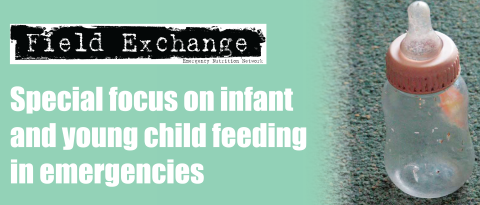Meeting on approaches to address moderate malnutrition in emergencies
The Emergency Nutrition Network (ENN) and Save the Children UK (SC UK) recently held a meeting on approaches to address moderate malnutrition in emergencies (29th-30th May 2008). This followed a study undertaken in 2006-7 reviewing the effectiveness of supplementary feeding programmes (SFPs) in emergencies1. The study highlighted a number of weaknesses of current emergency SFPs and made recommendations for improved supplementary feeding programming, including exploration of alternative approaches to address moderate malnutrition. This led to the preparation of three draft research protocols and one project proposal (Box 1) prepared by Dr Carlos Navarro-Colorado, independent consultant, on behalf of ENN and SC UK. This work and post-meeting revisions were funded by USAID's Office for Disaster Assistance (OFDA). The participants at the meeting represented academic, non-governmental organisations (NGOs), United Nations (UN) agencies and donor constituencies.
The specific objectives of the meeting were to:
- Finalise research protocols by resolving outstanding questions and reach agreement on protocols.
- Gain expressions of interest to support the research by technical experts, implementing agencies and donors.
- Identify potential project sites for research and where there are gaps.
- Consider implementation issues, e.g. resources, pre-planned versus opportunistic, ethics, institutional coordination, etc.
- Reach agreement on minimum reporting guidelines and a proposal to implement guidelines across agencies.
Day one of the two day workshop began with a recap of the SFP review and an introduction to the rationales for the proposed protocols. The protocols were presented alongside outstanding methodological questions. Working groups were convened to discuss the research protocols and address questions. Working groups then fed back to plenary session.
The second day began with a plenary session, aimed at resolving outstanding questions and clarifying minimum reporting guidelines and the related proposal. Interest amongst agencies in using a minimum reporting template and submitting data to a central repository was gauged. Plenary participants were then asked to pledge interest and commitment to participating in one or more of the research studies. Working groups then reconvened to address research implementation questions and issues: agency involvement, locations for studies, resourcing, ethics, and institutional coordination. This was followed by a plenary session to discuss working group findings. The day concluded with a presentation from the participating donors on their areas of work where relevant to the meeting and potential interest in supporting the research.
Main outcomes of the meeting
There was a high level of support for a research programme to strengthen approaches to address moderate acute malnutrition in emergencies.
A number of specific recommendations for modification to individual research protocols and the minimum reporting proposal were made.
Agencies (international NGOs, UN and donors) and individual academics pledged interest and support for one or more of the studies/proposals.
Ways forward
The three research protocols and the minimum reporting proposal are being refined based on input from the meeting, scheduled for completion by the end September 2008. The Minimum Reporting Standards proposal and a proposal to fund the defaulting project (Protocol 3) were prioritised and have subsequently secured funding from OFDA for implementation from 31 September 2008 (see news piece this issue, p18).
For further information and minutes of the meeting, please contact: Frances Mason, SC UK, email: F.Mason@savethechildren.org.uk or Jeremy Shoham, ENN, email: jshoham@easynet.co.uk
Box 1: Summary of Draft Research Protocols/Proposals
Protocol One: Comparison of the cost-effectiveness of three different approaches to addressing moderate malnutrition at population level in emergencies versus the standard response of a general food distribution (GFD) in combination with targeted SFPs using fortified corn soya blend (CSB) (control group). The three comparative approaches are:
Approach one: Comparison with an expanded general ration of approximately 2400 kcals per capita per day with additional calories provided by fortified CSB (ideally located in multi-camp settings).
Approach two: Comparison with a cash distribution of equivalent value to the GFD and SFP (located within resident populations).
Approach three: Comparison with a targeted and blanket distribution of a Ready to Use Food (RUF) (multi-nutrient spread) - ideally conducted in two different regions or countries, one with low and one with high baseline levels of global acute malnutrition (GAM).
Protocol Two: Comparison of the efficacy of treating moderate acute malnutrition with three different food rations in order to determine the relative merits of a selection of different products e.g. Supplementary plumpy and SP-450, compared to a control group receiving CSB-oil-sugar.
Protocol Three: To improve understanding of the phenomenon of default in centre-based SFPs. This is with a view to improving designs that accommodate constraints faced by potential beneficiaries to programme participation in a variety of emergency settings.
Minimum Reporting Standards Project Proposal: Development of a set of minimum reporting standards for SFPs, including:
- the consideration of the development of software to allow easy implementation of these reporting standards, and
- formation of a consortium of agencies which will implement the new reporting format and submit data to a central repository for further analysis.
1A Retrospective Study of Emergency Supplementary Feeding Programmes. Dr Carlos Navarro-Colorado. June 2007 Save the Children UK, Emergency Nutrition Network. Available at www.ennonline.net
Imported from FEX website


